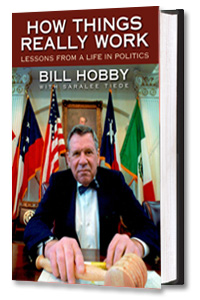In Texas the law is clear. Governing bodies must conduct the people’s business in public or else face some serious penalties. This statute has protected the public and elected representatives alike for the past 42 years with a basic premise: Public bodies should deliberate in public.
The days of making backroom good ol’ boy deals in private are a thing of the past because the Texas Legislature outlawed it by passing the Open Meetings Act in 1967, and strengthening it in 1973 after the infamous Sharps-town scandal.
Yet, there are some serious and troubling attempts under way that could open the door for that very thing to occur. At least three Texas cities and the Texas Municipal League are endorsing a legal challenge in the courts that will render Texas’ Open Meetings laws ineffective. TML, which is supported by your tax money in the form of membership fees, is urging more than 1,100 Texas cities to sign on to a federal lawsuit.
The details of the challenge are stated simply: These public officials claim the Texas Open Meetings Act unconstitutionally restricts their right of free speech under the First Amendment. Of course, they are free to say anything they wish to anyone they wish at any time they wish. However, when they are meeting as a quorum of a governmental body, they must say it in front of the public at an open meeting.
Even more importantly, the First Amendment cannot be a shield to prevent accountability of public officials, but guarantees access to the workings of these governmental bodies just like it does to our courts.
TML wants criminal penalties such as jail time stripped from the law that has protected the public for more than four decades. It believes the current language is too punitive and argues “… less restrictive penalties would not only continue to preserve the integrity of the Texas Open Meetings Act but would also recognize the fundamental right of city officials to free speech.”
In other words, if public officials break the law in the future by conducting business in secret — i.e., exercising their rights to free speech behind closed doors, a slap on the wrist should be punishment enough.
It simply defies logic and apparently not all of TML’s own members agree with this position. As reported in The Brownsville Herald, Nov. 21, 2009, TML board member and Mercedes Mayor Joel Quintanilla said, “Either I misunderstood the entire meeting or something is happening. The way I understood it, we all (board members) voted in favor of keeping the restrictive penalties, not lessening them.” Quintanilla went on to say, “We didn’t want elected officials to get comfortable.”
He’s not the only one apparently confused by TML’s action. Mercedes Commissioner Ruben Guajardo is also quoted as saying, “The consensus (of the TML Resolutions Committee) was that things were fine the way they were (with the Texas Open Meetings Act) and that trying to reinvent the wheel was not in the best interest of everyone involved …. We (the resolutions committee) felt that to change something (in the meetings act) was just not correct. It really wasn’t right. The consensus was to leave the Texas Meetings Act the way it is.”
I couldn’t agree with Commissioner Guajardo or Mayor Quintanilla more. As a member of the public, I am left confused by what is happening, and why. But I do know this. I don’t want elected officials to get too comfortable either, because I have seen firsthand what can happen if they do.
I hope you will join me in supporting the idea that the Open Meetings Act should be left intact and open government, without any strings attached, should continue to be the law in Texas. I also urge you to contact your city leaders and encourage them not to join in this effort that could weaken the Texas Open Meetings laws.
If clarifications are needed to address modern day changes such as electronic and digital communications, then they should be made at the statehouse — not city hall. And, at a minimum, you should point out to your public servants that any discussion on this or any other issue involving free speech should be debated in a public meeting instead of a rubber-stamp style vote to please Austin lobbyists.
Hobby served as Texas lieutenant governor 1973-91.

